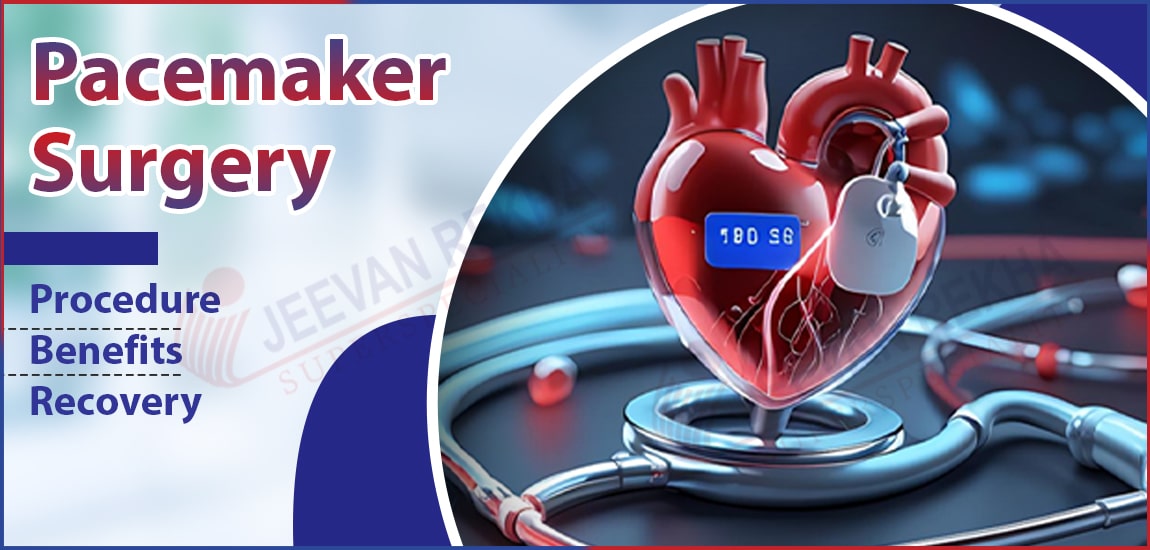
- By Admin
- In Health and Tips,
- Posted October 10, 2025
Pacemaker Surgery: Procedure, Benefits & Recovery
Pacemaker implantation saves lives by correcting rhythms on the heart through implanting a small device under the skin. Therefore, in order for you to understand the operation itself, who requires and the recovery period, you will need to be acquainted with it if someone has been suggested for the implantation of a pacemaker or could be the implantation considered for yourself or a loved one. This guide will cover pacemaker implantation procedures, benefits, and recovery while answering some frequently asked questions.
What Is a Pacemaker?
A pacemaker is a miniature medical device implanted subcutaneously, usually in the shoulder area beneath the collarbone, to treat abnormal heart rhythms. It sends the electrical signals to the heart to maintain the rhythm.
Conditions such as bradycardia (slow heart rates) or arrhythmias (irregular heartbeats) are treated with pacemakers, which could lead to death if left untreated. The device contains a pulse generator (small implantable box) and the leads (thin insulated wires) that connect the generator to the heart.
Who Needs a Pacemaker?
Indications for pacemaker implantation include severe arrhythmias where either the heart beats extremely slow or irregularly. These are commonly encountered cases that may require the insertion of a pacemaker:
- Bradycardia: It is the pathological condition where blood flow is impaired by the heart beating abnormally slow.
- Heart blocks: Delays or blocks to electrical signals disturb the heart's normal rhythm.
- Atrial fibrillation, or AFib: AFib is primarily treated with the use of a pacemaker to control the heart's rate.
- Sick sinus syndrome: A diverse group of arrhythmias that occur when the heart's natural pacemaker fails.
If your doctor determines, from your symptoms, medical history, and diagnostic tests such as an ECG or Holter monitor, that you will require a pacemaker.
What can I expect during a pacemaker surgery (pacemaker implantation)?
Typically, a pacemaker implantation is an outpatient procedure and is minimally invasive. Here is what you can expect:
- Preparation: You may be required to hold some of your medications before your surgery. The area where the pacemaker will be placed under the skin will be numbed with a local anesthetic.
- Incision: The surgeon will make a small incision in the area, close to your collar bone, where the pacemaker is going to be placed under the skin. In some cases, if the placement is more complicated, a larger incision may be made.
- Lead Placement: The thin flexible wires (the leads) will be inserted through a vein, and carefully guided to the heart. The leads will be connected to the pacemaker.
- Testing and Adjustments: Once the leads have been placed, the pacemaker will be tested to check for its correctness; the settings are adjusted to suit your heart requirements.
- Closing the Incision: Once everything is set, the incision is sutured, and you may be watched for some time to ensure no immediate complications arise.
The surgery itself should take a few hours, and most patients get to go home that same day. The whole process is done under local anesthetic; thus, you will be awake as they proceed but won't be able to feel pain.
You Can Read Also: प्रोस्टेट बढ़ने के लक्षण, कारण, उपचार और परहेज
What Are the Benefits of Pacemaker Surgery?
The advantages of pacemaker surgery is numerous, especially for those experiencing a heart rhythm disorder. Here are some key benefits to note:
- Improved Heart Function: The pacemaker regulates and monitors the heart's rhythm, thereby allowing the heart to beat at a good rate to role the blood to the body.
- Higher Energy Level: When the heart beats better, the patient may see a higher energy level, less instances of dizziness, and more rare instances of fatigue.
- Prevention of Some Complications: The pacemaker is designed to prevent a potentially life threatening complication related to arrhythmias, such as stroke or heart failure.
- Better Quality of Life: Patients are able to enjoy a better quality of life with their hearts functioning on a more steady rhythm. Increased social activities are present without fear of feeling dizzy or fainting.
- Longevity: Certain heart rhythm disorders may be fatal without intervention; a pacemaker would thus improve the chance to survive. With adequate management, many patients may live active lives with no restrictions.
How Long Does Pacemaker Surgery Recovery Take?
The recovery after the implantation of a pacemaker is typically very fast, but it is still important to care for the site as with any other procedure. Here is what to expect:
- First few days: after the procedure, the patient should expect to be in the hospital for a day or two. During that time the team will monitor the patient heart rate, and make sure the pacemaker is working for the patient.
- Incision care: the patient will receive post-procedure instruction of caring for the incision area, and to keep it clean and dry, to help with healing. The patient should refrain from strenuous activity and heavy lifting for a few weeks until healing has occurred.
- Follow up appointments: The patient will be scheduled for follow up appointments with the cardiologist to monitor the pacemaker function, and potentially adjust it, usually within the first few weeks or months.
- Activity restrictions: the patient should refrain from vigorous exercise or anything that would stress the chest area for about a few weeks. Heavy lifting, and contact sports are included in this restriction.
- Long term care: after the recovery has occurred, the patient should be able to return to their normal life. The pacemaker will need to be checked over time, which is usually every 6 to 12 months.
You Can Read Also: Nerve Stroke: What It Is, Causes, Symptoms & Prevention and Treatment
Why Choose Jeevan Rekha Hospital, Jaipur for Pacemaker Surgery?
Jeevan Rekha Hospital is headquartered in Jaipur and is considered to be one of the ultimate centers for cardiac care and pacemaker surgery. A handful of well-trained cardiologists and surgeons complete the facility with state-of-the-art technology to ensure that the entire pacemaker implantation process from diagnosis to recovery is carried out with top-notch patient care.
The hospital provides patient-centered care, meaning that each patient’s individuality is respected when it comes to the treatments they must receive. Whether it is your first pacemaker surgery or just follow-up, Jeevan Rekha Hospital administers an all-encompassing treatment plan, coupled with excellent post-operative support so as to get the best outcome for you.
Conclusion
A pacemaker surgery is a vital intervention for people with arrhythmias. By helping the heart to beat at a steady pace, and it can greatly increase the well-being and life satisfaction of an individual. The procedure is safe, effective, minimally invasive, with short recovery time.
In case you or a loved one is contemplating pacemaker implantation, it is highly recommended that you get yourself acquainted with the particular needs and its benefits along with your trusted healthcare provider. Jeevan Rekha Hospital Jaipur has the proficiency in taking care of and treating patients going through the pacemaker surgery, thereby making their way comfortable and effective from diagnosis to recuperation.
Frequently Asked Questions (FAQs)
- How long does the pacemaker last?
A pacemaker usually lasts from about 5 to 15 years, depending on use and the type of device.
- Can I actually resume a normal life after pacemaker surgery?
Yes, generally, a person might go on to do normal things albeit the patient must avoid heavy lifting and strenuous activities for the first few weeks during the recovery period.
- Are there risks in the pacemaker surgery?
Certainly. A pacemaker surgery is normally one that is very safe, but just like any other procedure, there remains a small chance of infections, bleeding, or problems with the pacemaker itself. Your doctor would explain these risks to you before proceeding with the surgery.
- How often do I have to see a doctor post-pacemaker surgery?
After the operation, in the first few weeks, you would typically still have to keep seeing your doctor for a follow-up appointment to make sure the pacemaker is working correctly. Annual check-ups are quite common as well.
Tags
Blog Search
Latest Posts
-
PCOS Awareness Month: What Is PCOS, Symptoms, Fertility & Best Treatment Options
February 24, 2026 -
Mild Heart Attack: How Serious Is It?
February 19, 2026 -
Skin Ulcers Uncovered: Causes, Types, Symptoms, and Healing Options
January 13, 2026 -
Is Coconut Water Safe During Pregnancy? Benefits, Risks & Myths
January 08, 2026 -
Dark Circles Under The Eyes: Causes, Home Remedies and Treatments
December 21, 2025




